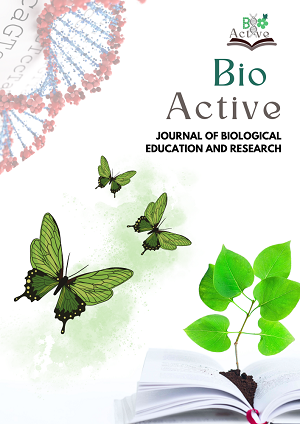Penerapan Problem-Based Learning Pada Materi Stoikiometri Larutan
Keywords:
Chemistry, Solution Stoichiometry, Problem-based LearningAbstract
Most 11th-grade science students exhibit low motivation and struggle with understanding chemistry because it is perceived as abstract, difficult, and irrelevant to everyday life, as evidenced by diagnostic test results showing persistent misconceptions in writing chemical reaction equations and equivalents. To address this issue, a problem-based learning (PBL) strategy is implemented to facilitate students' understanding of concepts through real-world problems.Structured assignments based on case study worksheets complement the students' learning process and become a bridge for them to see God's providence in His creation. This paper aims to evaluate the effectiveness of applying PBL to stoichiometric solution material in 11th grade using a descriptive qualitative method. Overall, the PBL approach enhances students' motivation and aids in comprehending abstract material. The learning outcomes showed that from 19 students, more than 10 successfully wrote ion equations, identified types of chemical reactions, and performed stoichiometric calculations when analyzing various real-world problems. The author acknowledges that not all students can capture all concepts in a limited time, because in the process there is still a need for personal guidance from the teacher for each student. Therefore, to improve future outcomes, it is crucial to provide special time for independent learning, enabling students to develop a deeper understanding and critical thinking skills.
References
Ardianti, R., Sujarwanto, E., & Surahman, E. (2021). Problem-based Learning: Apa dan Bagaimana. DIFFRACTION: Journal for Physics Education and Applied Physics, 3(1), 27–35. https://doi.org/10.37058/diffraction.v3i1.4416
Chang, R. (2004). Kimia Dasar: Konsep-konsep Inti (3 ed.). Jakarta: Penerbit Erlangga.
Helenia, I., Zubaidah, & Bistari. (2017). Pengaruh pemberian bentuk umpan balik (feedback) terhadap hasil belajar matematis siswa kelas VII SMP. KHATULISTIWA: Jurnal Pendidikan dan Pembelajaran, 6(12), 1–8. https://doi.org/https://dx.doi.org/10.26418/jppk.v6i12.23104
Ismayanti, I., Arsyad, M., & Marisda, D. H. (2020). Penerapan Strategi Refleksi Pada Akhir Pembelajaran Untuk Meningkatkan Keterampilan Berpikir Kreatif Peserta Didik Pada Materi Fluida. Karst : Jurnal Pendidikan Fisika Dan Terapannya, 3(1), 117–121. https://doi.org/10.46918/karst.v3i1.573
Knight, G. R. (2009). Filsafat & Pendidikan: Sebuah Pendahuluan dari Perspektif Kristen. Jakarta: Michigan: Andrews University Press.
Lennox, J. C. (2024). Can Science Explain Everything. Yogyakarta: PBMR ANDI (Penerbit Buku dan Majalah Rohani).
Lestari, S. W., Subhan, M., & Pratama, D. (2021). Pengembangan Lembar Kerja Peserta Didik (Lkpd) Ipa Berbasis Model Problem-Based Learning (Pbl) Di Kelas Iv Sekolah Dasar. Jurnal Dharma PGSD, 1(2), 2021. Diambil dari http://ejournal.undhari.ac.id/index.php/judha
Manusama, L. (2015). Allah Dan Alam. Kenosis, 1(2), 187–203. https://doi.org/http://dx.doi.org/10.37196/kenosis.v1i2.28
Petrucci, R. H. (2008). Kimia Dasar (9 ed.). Jakarta: Penerbit Erlangga.
Purba, F., Sitinjak, D. S., & Sinaga, K. (2021). Applying Science Process Skills in Understanding Chemical Equilibrium Through Experiment. Jurnal Akademika Kimia, 10(2), 78–86. https://doi.org/10.22487/j24775185.2021.v10.i2.pp78-86
Rachman, D. F. (2017). Pengembangan Perangkat Pembelajaran Ekosistem di SMA dengan Penugasan Presentasi Poster. Mangifera Edu, 2(1), 8–19. https://doi.org/10.31943/mangiferaedu.v2i1.14
Rusandi, & Muhammad Rusli. (2021). Merancang Penelitian Kualitatif Dasar/Deskriptif dan Studi Kasus. Al-Ubudiyah: Jurnal Pendidikan Dan Studi Islam, 2(1), 48–60. https://doi.org/10.55623/au.v2i1.18
Saragih, M. J., Hidayat, D., & Tamba, K. P. (2019). Implikasi Pendidikan Yang Berpusat Pada Kristus Dalam Kelas Matematika [the Implications of Christ-Center Education for Mathematics Classes]. JOHME: Journal of Holistic Mathematics Education, 2(2), 97. https://doi.org/10.19166/johme.v2i2.1695
Sproul, R. . (2023). Kebenaran-kebenaran Dasar Iman Kristen (Cet 13). Malang: Literatur SAAT.
Yuliani, W. (2018). Metode penelitian deskriptif kualitatif dalam perspektif bimbingan dan konseling. QUANTA: Jurnal Kajian Bimbingan Dan Konseling Dalam Pendidikan, 2(2), 83–91. https://doi.org/10.22460/q.v1i1p1-10.497

Downloads
Published
Issue
Section
License
Copyright (c) 2025 Friska Purba, Christine Febriandini Tinambunan

This work is licensed under a Creative Commons Attribution-ShareAlike 4.0 International License.

.png)
.png)






